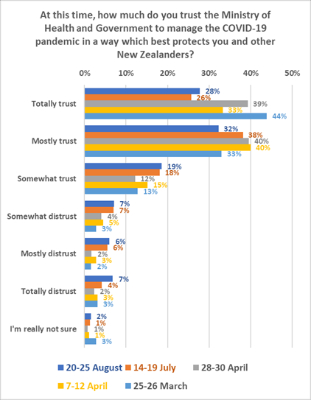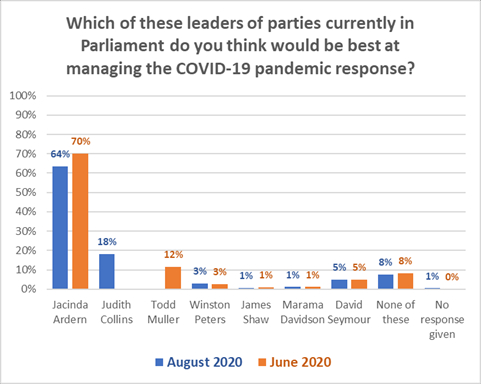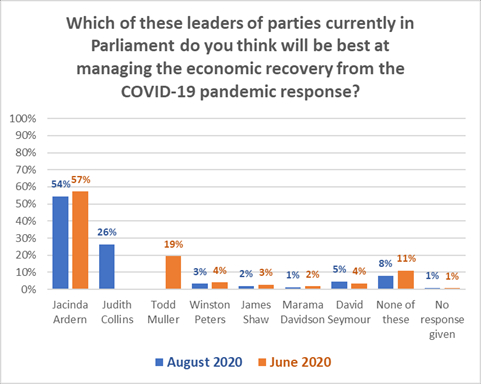Second COVID-19 Wave And Lockdowns Reduce Trust In Government By 3%
Overall trust and confidence in the Ministry of Health and Government’s response to managing COVID-19 has fallen 3% following the second wave of infection and lockdowns.
Overall trust was 82% in mid-July 2020. It is 79% in late August.
This is down from a high of 91% during the Alert Level 4 lockdown in April 2020.
While trust and confidence has largely held up across all adults, trust among business proprietors and the self-employed has fallen drastically, from 71% in mid-July to 49% in late August.
Among business managers and executives, trust has also fallen, but not as markedly: from 73% in mid-July to 67% in late August.
However, it is not all bad news for the Government.
While business proprietors, self -employed and farm owners/managers may have much lower trust in the management of the pandemic, trust among every other occupation group (including “homemakers” and the retired) has either fallen only slightly, remained steady or increased.
Trust has increased among:
· Those aged 18-24 years (by 10%)
· Technical/Mechanical/Skilled workers
· Homemakers
· Those flatting or boarding
· Those with personal incomes of between $150,000 and $200,000 per annum
· 2017 ACT, NZ First voters and likely new voters: those who were not eligible to vote in 2017.
Among those who voted in 2017 for the parties currently in Parliament, only National supporters have less trust, but 64% of them still trust the Ministry of Health and the Government management of the pandemic.
Overall distrust is 20%. This is up from 17% in mid-July and 10% in April.
The survey, of 1,300 adults nationwide (maximum margin of error +/- 2.7%) was conducted between August 20 and 25 while Auckland was in Level 3 lockdown, and the rest of the country at Level 2.
Just before and during the survey period the extent of testing of border staff for COVID-19 before the second wave was being strongly debated, opposition parties released COVID-19 policy for the October 17 general election and a four-day extension of the Auckland restrictions had been announced.

Ardern best leader to manage pandemic
Jacinda Ardern continues to be seen as the best leader to manage the COVID-19 pandemic response.
64% rate her as the best leader on the response, compared with 18% for Judith Collins.
The next highest of six leaders surveyed was David Seymour of ACT, with 5%, followed by 3% for Winston Peters, 2% for James Shaw and 1% for Marama Davidson. 8% said none of these leaders were best to manage the response.
Judith Collins is seen as more effective at managing the pandemic response than previous National leader Todd Muller, gaining 6% over Muller’s 12% rating in June 2020.
However, Ms Collins has not won over all of those who voted for her party at the 2017 general election, 36% of whom see Jacinda Ardern as best to manage the pandemic response (down from 40% in June 2020).

Among the occupation groups, only Farm Owners/Managers think that Judith Collins would be better to manage the pandemic response than Jacinda Ardern.
Ardern best leader to manage economic recovery
It is the same story overall with the management of the economic recovery from the pandemic response.
54% think Jacinda Ardern is best to manage the economic recovery, compared with 26% who think Judith Collins is best. Ms Collins, however, rated more highly than her predecessor Todd Muller, who rated 19% in June 2020.

Methodology
1,300 members of Horizon Research nationwide panels and a third-party research panel, representing the New Zealand adult population at the 2018 census, responded to the online survey between 20 and 25 August 2020.
The sample is weighted on age, gender, highest qualification, personal income, employment status and party vote at the 2017 election. At a 95% confidence level, the maximum margin of error is +/- 2.7%.
The survey was self-commissioned by Horizon Research as part of COVID-19 research conducted in the public interest since late March 2020.
www.horizonpoll.co.nz


 Gordon Campbell: On The Clash Between Auckland Airport And Air New Zealand
Gordon Campbell: On The Clash Between Auckland Airport And Air New Zealand Fire and Emergency NZ: Check Your Smoke Alarms When Clocks Go Back This Sunday
Fire and Emergency NZ: Check Your Smoke Alarms When Clocks Go Back This Sunday NZ Government: Repeal Of 7AA Puts Child Wellbeing First
NZ Government: Repeal Of 7AA Puts Child Wellbeing First NZ Government: Reducing Ambiguity About What Is Reasonably Practicable For Health And Safety Compliance
NZ Government: Reducing Ambiguity About What Is Reasonably Practicable For Health And Safety Compliance Office of the Speaker: New Zealand Parliamentarians Attend 150th IPU Assembly
Office of the Speaker: New Zealand Parliamentarians Attend 150th IPU Assembly RNZRSA: RNZRSA Supports Willie Apiata VC's Stand To Drive Change To Veterans’ Support Act
RNZRSA: RNZRSA Supports Willie Apiata VC's Stand To Drive Change To Veterans’ Support Act Diane McCarthy - LDR: War Hero Willie Apiata Entrusts MP With Victoria Cross Medal
Diane McCarthy - LDR: War Hero Willie Apiata Entrusts MP With Victoria Cross Medal


